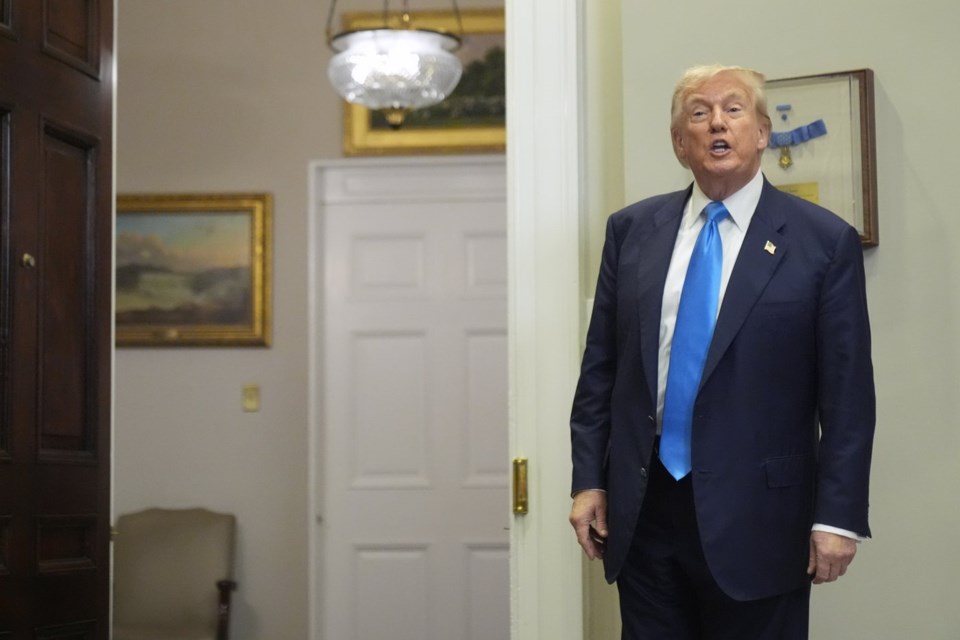WASHINGTON — Prime Minister Mark Carney said Friday his government is disappointed that U.S. President Donald Trump followed through on his threat to increase tariffs on Canada to 35 per cent if Ottawa didn't make a trade deal.
"While we will continue to negotiate with the United States on our trading relationship, the Canadian government is laser focused on what we can control: building Canada strong," Carney said in a media statement released just after midnight.
The White House has said the tariffs will not affect goods compliant with the Canada-U.S.-Mexico Agreement on trade, commonly known as CUSMA.
Earlier in the week, Carney had been tempering expectations of an agreement materializing by Friday, saying Ottawa will only agree to a deal "if there's one on the table that is in the best interests of Canadians."
Carney has described the trade talks as complex, comprehensive and constructive. Trump, meanwhile, has complained repeatedly about America's northern neighbour.
Trump signed an executive order Thursday night to hit Canada with the increased duties. A fact sheet from the White House rationalized the rate change by claiming Canada "failed to co-operate in curbing the ongoing flood of fentanyl" and citing Ottawa's implementation of retaliatory tariffs.
Carney said that "Canada accounts for only one per cent of U.S. fentanyl imports and has been working intensively to further reduce these volumes."
Canada-U.S. Trade Minister Dominic LeBlanc, who was in Washington this week, was in touch with U.S. Commerce Secretary Howard Lutnick on Thursday, his office confirmed.
Trump's 50 per cent tariffs on semi-finished copper also came into effect just after midnight, but the latest duty exempts the raw input material. Canada is also being slammed by Trump's tariffs on steel, aluminum and automobiles.
Reaction to the tariffs in Canada was swift, with political leaders saying Canada should hold out for the right deal. Conservative Leader Pierre Poilievre said his party wants a deal that will end all U.S. tariffs on Canada, including Trump's sectoral duties on specific industries.
"That is the deal Canada had before and the Prime Minister should accept nothing short of that," Poilievre said in a post on social media.
New Brunswick Premier Susan Holt said she is "reassured that Minister LeBlanc is still at the table" and "confident that our federal partners will find a path forward for our people and our economy."
Alberta Premier Danielle Smith and Saskatchewan Premier Scott Moe both said that while they're pleased the CUSMA carveout remains in place, they're disappointed to see tariffs on other Canadian goods increased. Moe said Ottawa should start removing counter-tariffs to help get a deal done.
Ontario Premier Doug Ford instead called for a stronger response, with additional retaliatory tariffs on U.S. steel and aluminum.
So far, the federal government has not announced additional measures.
Jacques Shore, trade analyst and partner in Gowling WLG's Ottawa office, said Canada needs to continue to "play it smart."
"Sometimes you flex your muscles best by being disciplined and not … looking at ways to kick your opponent or hurt your opponent," Shore said. "And I think that what we need to do, if I can sort of stick to the hockey analogy is … keep your head up and skate hard to the goal.''
About 80 to 90 per cent of Canadian goods might be able to avoid Trump's higher tariffs because they comply with CUSMA's rules of origin, said Michael Dobner, the national leader of economics and policy practice at PricewaterhouseCoopers Canada.
That doesn't mean all of those exporters have filed the necessary paperwork to avoid the duties, he added. It's not clear exactly how much of what Canada exports to the United States now is CUSMA-compliant.
While no industry can be singled out as the one most at risk, Dobner said, any business that must use many parts sourced outside North America is in jeopardy of increased duties.
Canadian Federation of Independent Business president and CEO Dan Kelly said many small- and medium-sized businesses are worried about facing the brunt of the duties.
They may not have the financial flexibility to change their inputs to North American products easily, or have the capacity to quickly get the paperwork to show CUSMA compliance.
The federation's data shows that, so far, most small businesses are absorbing some or all of the costs associated with Trump's tariffs, under the assumption that Canada will find some sort of solution.
"Is 35 per cent going to be the straw that breaks the camel's back?" Kelly said.
Kelly said if Canada remains in "no man's land," Ottawa should release funds collected by retaliatory tariffs to help struggling businesses.
Both Kelly and Dobner said that while the increase in tariffs will be terrible for some businesses, the larger concern for all industries is the ongoing uncertainty that has put a chill on investment.
"Generally speaking, even without that increase, there has been a bit of a freeze in investment in Canada," Dobner said.
— With files from Émilie Bergeron in Ottawa, Jeremy Simes in Regina, Hina Alam in Fredericton and The Associated Press
This report by The Canadian Press was first published Aug. 1, 2025.
Kelly Geraldine Malone, The Canadian Press



